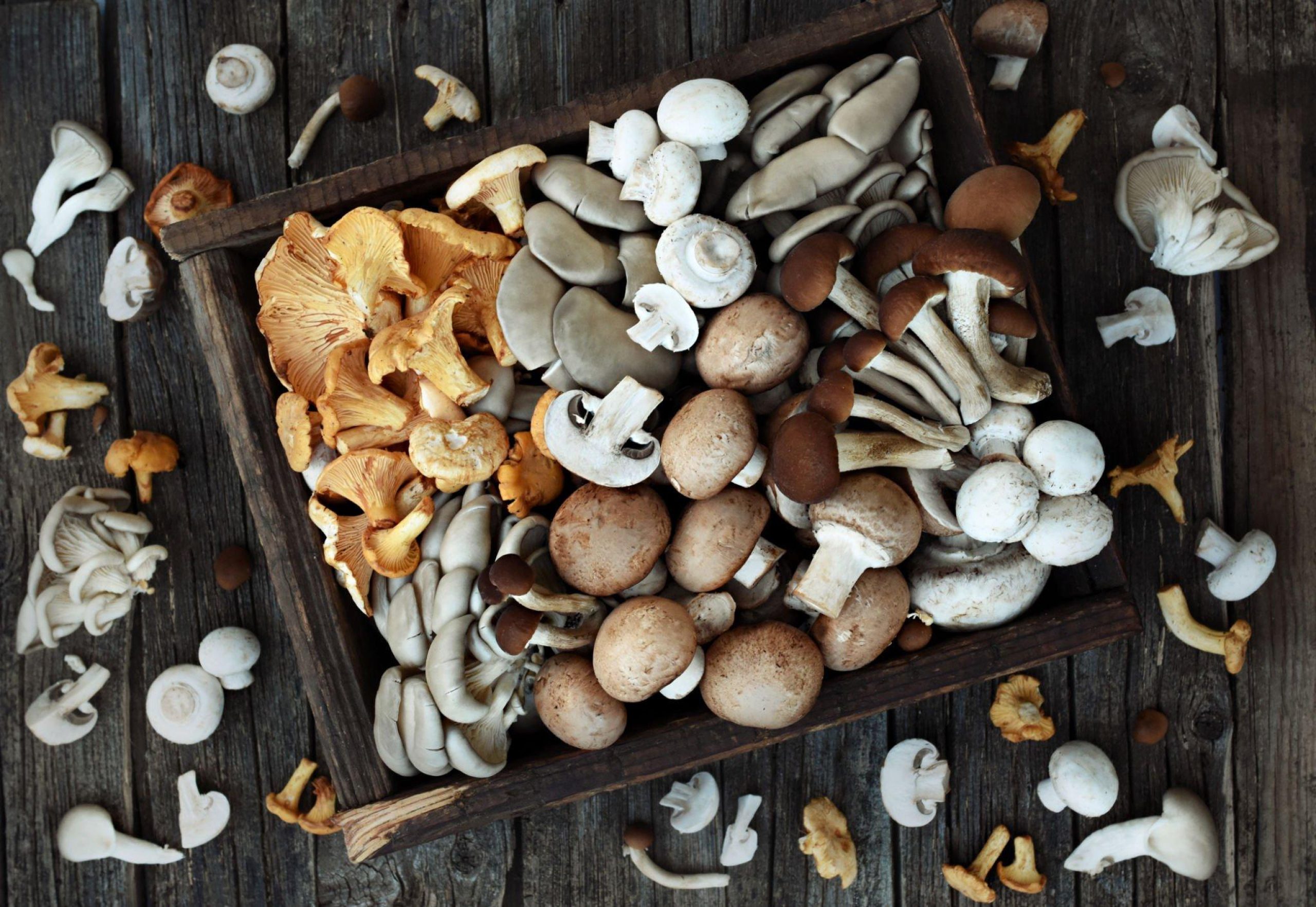Mushrooms
Mushrooms are fungi, not plants. They belong to the kingdom Fungi, which is a separate biological kingdom distinct from animals and plants. Fungi are known for their unique way of obtaining nutrients, typically by decomposing organic matter or forming mutualistic relationships with other organisms.
Mushroom Characteristics:
- Fruiting Bodies: Mushrooms are the reproductive structures of fungi. They are often referred to as the “fruiting bodies” and are the most visible part of the fungus.
- Diversity: Mushrooms come in a wide variety of shapes, sizes, and colors. Some are edible and highly prized in cuisines around the world, while others are toxic or hallucinogenic.
- Ecological Importance: Mushrooms play a crucial ecological role as decomposers. They break down dead organic matter, helping to recycle nutrients and enrich the soil.
- Mycorrhizal Associations: Many mushrooms form symbiotic relationships with plants, known as mycorrhizae. These associations benefit both the mushrooms and the plants by aiding in nutrient uptake and disease resistance.
- Cultural Significance: Mushrooms have been a part of human culture and folklore for centuries. They have been used in religious rituals, traditional medicines, and even as a source of artistic inspiration.
Mushrooms: Nature’s Hidden Gems
Mushrooms, often hidden beneath the forest canopy or tucked away in the soil, are indeed nature’s hidden gems. These unique and diverse fungi have captivated human curiosity for centuries, offering a wealth of intrigue and value in various aspects of our lives.
1. Biodiversity and Ecological Importance:
- Beneath the forest floor, mushrooms play a vital role in recycling nutrients. They act as nature’s recyclers, breaking down organic matter and enriching the soil, which supports the growth of plants and trees.
2. Culinary Delights:
- Mushrooms have long been cherished for their culinary versatility. They come in a vast array of flavors, textures, and sizes, from the delicate enoki to the robust porcini, enriching dishes around the world.
3. Medicinal Wonders:
- Some mushrooms possess incredible medicinal properties. Reishi, for example, is revered in traditional medicine for its potential to boost the immune system and promote overall wellness.
4. Mycorrhizal Mysteries:
- Mycorrhizal fungi form symbiotic relationships with plants, facilitating nutrient exchange and enhancing plant health. This intricate partnership sustains many ecosystems.
5. Cultural Significance:
- Mushrooms hold a place in the folklore and culture of numerous societies. They have been featured in art, literature, and rituals, often symbolizing mystery, renewal, and transformation.
6. Hidden Hazards:
- Yet, not all mushrooms are safe to eat. Some are toxic, even deadly. Recognizing the distinction between edible and poisonous species is crucial for anyone venturing into mushroom foraging.
7. Conservation and Exploration:
- Scientists continue to uncover new mushroom species, and mycologists explore their potential benefits. The study of fungi holds promise for future discoveries in medicine, agriculture, and environmental conservation.
Nutritional Value of Mushrooms
Mushrooms offer a range of nutritional benefits and can be a valuable addition to a balanced diet. The exact nutritional composition can vary somewhat depending on the mushroom variety, but here’s a general overview of the nutritional value of mushrooms:
1. Macronutrients:
- Calories: Mushrooms are relatively low in calories, making them a good choice for those seeking to manage their calorie intake. They typically contain about 20-40 calories per 100 grams, depending on the variety.
- Protein: Mushrooms are a source of plant-based protein, with roughly 2-3 grams of protein per 100 grams.
- Carbohydrates: They are low in carbohydrates, with about 3-4 grams per 100 grams.
- Dietary Fiber: Mushrooms are a decent source of dietary fiber, with roughly 2-3 grams per 100 grams. Fiber is beneficial for digestive health.
2. Vitamins:
- B Vitamins: Mushrooms, particularly varieties like shiitake and cremini, are rich in various B vitamins, including riboflavin (B2), niacin (B3), pantothenic acid (B5), and folate (B9). These vitamins are essential for energy metabolism and overall health.
- Vitamin D: When exposed to sunlight or UV light during growth, mushrooms can synthesize vitamin D. This makes them one of the few plant-based sources of this important vitamin.
3. Minerals:
- Selenium: Mushrooms, especially shiitake mushrooms, are a good source of selenium, an essential mineral with antioxidant properties.
- Copper: They contain copper, which is important for the production of red blood cells and overall health.
- Potassium: Mushrooms contain potassium, which is necessary for maintaining proper muscle and nerve function, as well as regulating blood pressure.
4. Antioxidants:
- Mushrooms contain various antioxidants, such as ergothioneine and glutathione, which can help protect cells from oxidative damage.
5. Other Compounds:
- Beta-Glucans: Some mushrooms, like shiitake and maitake, contain beta-glucans, which may have immune-boosting and cholesterol-lowering properties.
- Ergosterol: This precursor to vitamin D can convert to vitamin D when exposed to UV light, making mushrooms a unique source of this vitamin for those with limited sun exposure.
Immune-Boosting Abilities
- Mushroom superpowers: Strengthening the immune system
- Unravelling the role of beta-glucans in immune modulation
- Establishing the link between mushrooms and reduced risk of infections
One of the most remarkable benefits of mushrooms lies in their ability to strengthen the immune system. Mushrooms possess unique compounds called beta-glucans, which have been shown to enhance immune function by activating key immune cells and promoting immune responses. Studies suggest that regularly consuming mushrooms may reduce the risk of infections and support overall immune health, making them an excellent natural ally in maintaining a robust immune system.
Fighting Chronic Diseases
- Reducing the risk of cardiovascular diseases with mushrooms
- Mushrooms as allies against cancer: Unveiling their anti-tumour properties
- Managing diabetes and promoting stable blood sugar levels with mushrooms
Mushrooms exhibit promising potential in reducing the risk of chronic diseases. Research suggests that certain varieties, such as Shiitake and Portobello mushrooms, may help lower cholesterol levels and decrease the risk of cardiovascular diseases. Moreover, the powerful anti-tumor properties found in various mushrooms, including Reishi and Chaga, make them valuable players in the fight against cancer. Additionally, mushrooms can aid in managing diabetes by assisting in stabilizing blood sugar levels, making them a valuable addition to a diabetic-friendly diet.
Enhancing Brain Health
- Examining the impact of mushrooms on cognitive function
- Unveiling the potential of mushrooms in preventing neurodegenerative diseases
- The role of mushrooms in boosting memory and creativity
The impact of mushrooms extends beyond physical well-being and into the realm of brain health. Scientists have observed potential cognitive benefits associated with mushroom consumption. Certain compounds found in mushrooms exhibit neuroprotective properties, suggesting a potential role in preventing neurodegenerative diseases such as Alzheimer’s and Parkinson’s. Additionally, mushrooms may aid in boosting memory and creativity, making them a delightful addition to any diet aimed at enhancing cognitive function.
- Portobello Mushrooms:
- Nutrient-Rich: Portobello mushrooms are a great source of essential nutrients like vitamins and minerals. They are particularly rich in B vitamins, including riboflavin (B2), niacin (B3), and pantothenic acid (B5). These vitamins are important for energy metabolism and overall health.
- Dietary Fiber: They are a good source of dietary fiber, which aids in digestion and helps maintain healthy gut flora.
- Antioxidants: Portobellos contain antioxidants like selenium, which can help protect cells from oxidative damage and support a healthy immune system.
- Copper: They are a notable source of copper, which is essential for the production of red blood cells and collagen formation.
- Shiitake Mushrooms:
- Immune Support: Shiitake mushrooms contain a compound called lentinan, which has been studied for its potential immune-boosting properties. It may enhance the immune system’s ability to combat infections and illnesses.
- Antiviral Properties: Some studies suggest that compounds in Shiitake mushrooms may have antiviral properties, potentially helping to inhibit the replication of certain viruses.
- Cholesterol Management: Shiitakes contain compounds like eritadenine, which may help regulate cholesterol levels and promote heart health.
- Rich in Nutrients: They are also a good source of essential vitamins and minerals, including vitamin D (when exposed to sunlight), vitamin B5, and selenium.
Mushroom Varieties and Their Health Benefits
Different mushroom varieties offer a plethora of unique health benefits. Shiitake mushrooms, for instance, are renowned for their potential to boost vitality and support cardiovascular health. Portobello mushrooms, on the other hand, pack a nutritional punch, delivering important vitamins and minerals. Oyster mushrooms, with their delightful taste, not only add variety to your palate but also offer health benefits such as immune support. Chaga mushrooms, known as an immune-boosting marvel, possess powerful antioxidant properties. Finally, Reishi mushrooms are revered for their ability to promote longevity and vitality, having been used in traditional medicine for centuries.
Top 10 Most expensive Mushrooms.
Mushrooms are not only appreciated for their culinary and potential health benefits but also for their value in specialty markets. Some mushrooms can be incredibly expensive due to their rarity, difficulty in cultivation, and unique flavors. Here are ten of the most expensive mushrooms in the world:
- White Truffle (Tuber magnatum): White truffles, found in Italy, are often considered the most expensive mushrooms in the world. They can sell for thousands of dollars per pound due to their strong aroma and earthy flavor.
- Matsutake Mushroom (Tricholoma matsutake): Matsutake mushrooms are highly sought after in Japanese cuisine. They can be quite pricey, especially the highest quality specimens.
- Black Truffle (Tuber melanosporum): Black truffles, found in various regions including France and Italy, are another highly valued mushroom variety. They are often used in gourmet dishes and can be expensive.
- Chanterelle Mushroom (Cantharellus cibarius): Chanterelles are known for their delicious, nutty flavor and golden appearance. High-quality chanterelles can command a high price.
- Morel Mushroom (Morchella spp.): Morels are prized for their unique appearance and earthy taste. They are often foraged in the wild, which can make them expensive.
- Lobster Mushroom (Hypomyces lactifluorum): Lobster mushrooms are known for their reddish appearance and seafood-like flavor. They can be costly due to their limited availability.
- Oyster Mushroom (Pleurotus ostreatus): While not as expensive as some others on this list, certain rare varieties of oyster mushrooms, such as the Italian Oyster Mushroom, can still be relatively pricey.
- Lion’s Mane Mushroom (Hericium erinaceus): Lion’s Mane mushrooms have a unique appearance and taste, often likened to seafood. They can be expensive when sold fresh.
- Porcini Mushroom (Boletus edulis): Porcini mushrooms are highly regarded in Italian cuisine. High-quality dried porcinis can be quite expensive.
- Cordyceps Mushroom (Cordyceps sinensis): Cordyceps are not your typical mushroom; they are a type of parasitic fungus that grows on caterpillars. They are highly valued in traditional Chinese medicine and can be expensive in various forms, including as a supplement.
The prices of these mushrooms can vary significantly depending on factors like quality, location, and availability. Truffles, in particular, are renowned for their extravagant prices, with some of the finest specimens selling for tens of thousands of dollars per pound.
Cooking with Mushrooms
- Exploring culinary delights with mushrooms
- Creative and delicious mushroom-based recipes
In addition to their outstanding nutritional value, mushrooms can add depth and flavor to various culinary creations. Whether sautéing them as a side dish, incorporating them into pasta dishes, or using them as a vegan alternative in savory recipes, mushrooms offer endless culinary possibilities. From decadent mushroom risottos to hearty mushroom soups, the versatility of mushrooms in cooking is unparalleled.
Here’s a simple and delicious recipe for Creamy Garlic Mushroom Pasta:
Ingredients:
- 8 ounces (about 2 cups) of your favorite pasta (such as fettuccine, linguine, or spaghetti)
- 2 tablespoons butter
- 2 tablespoons olive oil
- 1 pound fresh mushrooms (button or cremini), thinly sliced
- 4 cloves garlic, minced
- 1/2 cup chicken or vegetable broth
- 1 cup heavy cream
- 1/2 cup grated Parmesan cheese
- 1 teaspoon dried thyme (or 2 teaspoons fresh thyme leaves)
- Salt and black pepper to taste
- Fresh parsley, chopped (for garnish)
Instructions:
- Cook the Pasta: Cook the pasta according to package instructions until it’s al dente. Drain and set aside.
- Sauté Mushrooms: In a large skillet, melt the butter and olive oil over medium-high heat. Add the sliced mushrooms and cook for about 5-7 minutes until they are browned and tender. Stir occasionally.
- Add garlic: Stir in the minced garlic and sauté for another 1-2 minutes until fragrant.
- Deglaze the Pan: Pour in the chicken or vegetable broth to deglaze the pan. Use a wooden spoon to scrape up any browned bits from the bottom of the skillet. Allow it to simmer for about 2-3 minutes to reduce slightly.
- Add Cream and Seasonings: Reduce the heat to medium-low. Pour in the heavy cream and stir to combine with the mushroom mixture. Add the dried thyme (or fresh thyme leaves), salt, and black pepper. Allow the sauce to simmer for 3-4 minutes to thicken slightly.
- Stir in Parmesan: Stir in the grated Parmesan cheese and continue to cook for another 2-3 minutes until the sauce is creamy and the cheese is melted.
- Combine Pasta and Sauce: Add the cooked pasta to the skillet with the mushroom sauce. Toss everything together until the pasta is coated evenly with the creamy mushroom sauce.
- Serve: Remove from heat and garnish with chopped fresh parsley. You can also sprinkle extra Parmesan cheese on top if desired.
- Enjoy: Serve your creamy garlic mushroom pasta hot, and enjoy!
This creamy mushroom pasta is a comforting and satisfying dish that’s perfect for a weeknight dinner or a special occasion. You can customize it by adding spinach, sun-dried tomatoes, or other vegetables for extra flavor and nutrition.
Mushroom Supplements: Are They Worth It?
- Understanding the mushroom supplement industry
- Assessing the efficacy and safety of mushroom supplements
With the rising popularity of natural supplements, mushroom-based supplements have gained attention in recent years. It is essential understand the mushroom supplement industry and educate oneself on the quality and sourcing of these products. While some mushroom supplements may offer potential benefits, it is imperative to assess their efficacy and safety, ensuring they are backed by reputable research and manufactured under stringent quality control measures.
Precautions and Side Effects
- Mushroom allergies and sensitivities
- Identifying poisonous mushrooms and the risk of toxicity
While mushrooms provide tremendous health benefits, it is vital to exercise caution. Allergies and sensitivities to mushrooms can occur, just like with any other food. Understanding and recognizing the symptoms of mushroom allergies can help individuals determine whether mushrooms are suitable for their consumption. Additionally, correctly identifying poisonous mushrooms is crucial to avoid the risk of toxicity, as certain species can be harmful or even fatal if ingested.
Frequently Asked Questions (FAQs)
Are all mushrooms edible?
- Not all mushrooms are edible. Some species might be toxic or even deadly. It is crucial to exercise caution and thoroughly educate oneself on safe and edible mushroom varieties.
Can mushrooms replace meat in a vegetarian or vegan diet?
- Mushrooms can be an excellent alternative to meat in vegetarian or vegan diets due to their meaty texture and umami flavor. However, it is important to ensure a well-balanced diet and consult with a healthcare professional or registered dietitian for personalized guidance.
Are there specific mushrooms recommended for children?
- While various mushrooms offer nutritional benefits, it is advisable to consult with a healthcare professional when introducing mushrooms to a child’s diet, especially considering individual dietary needs and potential allergies.
Can mushrooms help with weight loss?
- Mushrooms are low in calories and high in fiber, which can aid in weight loss efforts by promoting a feeling of fullness. However, mushrooms alone cannot guarantee weight loss, and a comprehensive approach to a healthy lifestyle is necessary.
How should mushrooms be stored to maintain their freshness?
- To maintain the freshness of mushrooms, it is best to store them in a paper bag in the refrigerator. This helps to preserve their texture and flavor while preventing excess moisture accumulation.
Are there any potential drug interactions with mushroom consumption?
- As with any dietary supplement, it is advisable to consult with a healthcare professional or pharmacist if taking medication, as certain mushrooms may interact with specific medications.
Conclusion
As we conclude our exploration of the unique health benefits offered by mushrooms, it is crucial to reflect on the tremendous potential they hold in promoting overall well-being. Their rich nutritional composition, immune-boosting abilities, and various disease-fighting properties make mushrooms a true gift from nature. By inspiring further research and inviting individuals to embrace the wonders of mushrooms, we can unlock even greater knowledge and harness their potential to support a healthy and vibrant life.














